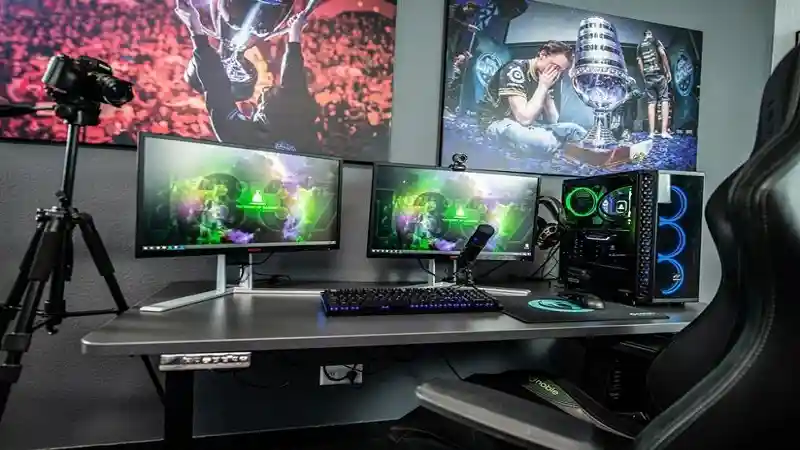The allure of an esports career is undeniable. Imagine the thunderous applause, the intense matches, and the taste of triumph. But, beneath the glamorous surface lies a rigorous journey demanding dedication, strategy, and adaptability.
With the industry projected to reach $1.79 billion by 2022, it’s clear that esports is a booming frontier. But how does one truly make it to the pro leagues? Let’s embark on this journey and uncover what it takes to go pro in esports.
Understanding the Esports Landscape
The first step to going pro is to understand the landscape. Esports is as diverse as traditional sports, with games ranging from League of Legends and Fortnite to Rocket League and Call of Duty.
Key Components of the Esports Industry:
- Game Publishers: They create and maintain the games.
- Tournament Organizers: They arrange competitions, from local events to worldwide championships.
- Team Organizations: They recruit and nurture talent.
- Sponsors: They provide financial support and product endorsements.
Example:
Consider Cloud9, a renowned esports organization. Recognizing the potential of League of Legends early on, they built a competitive team, catapulting them to fame. Such strategic choices highlight the importance of understanding the industry’s dynamics.
Building a Strong Foundation
Talent is just one piece of the puzzle. Crafting a solid foundation is vital for longevity in the esports world.
Key Steps to Building a Solid Foundation:
- Choose the Right Game:
- Focus on popular titles like Valorant, Overwatch, and Fortnite.
- Research their communities and competitive scenes.
- Create a Compelling Gamer Profile:
- Highlight achievements, from tournament victories to personal milestones.
- For inspiration, observe esports icons such as Ninja, Faker.
- Develop an Online Presence:
- Engage on platforms like Twitch and YouTube.
- Share your journey, interact with fans, and build a loyal following.
- Attend tournaments both locally and virtually.
- Get noticed, experienced, and recognized.
- Start small and aim for higher-level competitions.
Example:
Esports Tower offers game-specific training for titles like Valorant, Rocket League, and Overwatch. They bring together players for dedicated scrimmages and practice sessions, providing a structured environment for growth.
Mastering Gameplay and Strategy
Having impeccable skills is a given, but true mastery involves continuous learning and adaptation.
Key Strategies for Mastering Gameplay:
- Analyze Professional Player Gameplay:
- Watch live streams and tournaments.
- Learn advanced techniques and strategies.
- Use Training Modes and Tutorials:
- Practice aiming, movement, and other game-specific skills.
- For instance, Dota 2’s ‘Last Hit Trainer’ helps players perfect their last hits.
- Implement Strategic Gameplay:
- Study team compositions, map strategies, and game phase planning.
- In games like Valorant, understanding when to deploy specific operators can make a difference.
- Review Your Gameplay:
- Recognize errors and opportunities for development, and monitor advancement over time.
- Stay Updated with Game Changes:
- Regular practice, strategy adaptations, and opponent scouting are essential.
Example:
In battle royale games like Fortnite, understanding game phase planning is crucial. Knowing where to land, when to engage, and when to avoid combat can determine your success.
Exploring Fantasy Esports for Skill Enhancement
Fantasy esports offers a unique way to enhance your strategic thinking and game knowledge. Platforms like FanDuel provide an opportunity to create and manage your fantasy teams. This experience goes beyond just playing; it challenges you to analyze players’ strengths, predict outcomes, and make tactical decisions that mirror professional team managers’ decisions.
By participating in fantasy esports, you’ll not only refine your ability to forecast player success but also gain deeper insights into the competitive landscape. This engagement helps you stay updated with current trends, player stats, and game meta, all of which are crucial for any aspiring pro.
Moreover, fantasy esports can serve as a supplementary training tool, allowing you to apply strategic concepts in a low-risk environment while staying connected with the broader esports community. Embrace this opportunity to level up your esports journey.
Building a Supportive Network
Esports is not a solo endeavor. Building a supportive network can provide the backing, guidance, and encouragement needed to succeed.
Key Steps to Building a Supportive Network:
- Get in touch with other gamers:
- Establish bonds with one another, exchange stories, and gain knowledge.
- involve friends and family members:
- Introduce them to esports.
- Encourage them to join you on your journey and ask for their support.
- Choose a coach or a mentor:
- • Get direction and input to accelerate your progress.
- Joining or creating a team:
- Work together to strategize and develop.
- Participate in online gaming communities:
- Share knowledge, get advice, and stay updated.
Example:
Getting involved in a team not only offers a disciplined practice setting but also cultivates a feeling of respect and community. Teams work together towards shared goals, enhancing both individual and collective success.
Navigating Challenges and Ensuring Longevity
The road to becoming a pro is fraught with challenges. Staying persistent and prepared is vital for a sustainable career.
Key Challenges and Strategies:
- Manage Stress and Pressure:
- Regular exercise and a balanced diet to boost physical and mental stamina.
- Practicing mindfulness and ensuring adequate rest.
- Handle Fame and Public Scrutiny:
- Maintain professionalism in all interactions.
- Manage personal privacy, set boundaries, and deal constructively with criticism.
- Balance Personal Life and Career:
- Effective time management to maintain relationships.
- Set aside time for hobbies and personal growth.
- Plan for Financial Stability:
- Engage with financial advisors.
- Explore other revenue streams like content creation or brand collaborations.
Example:
Sponsorships, merchandise sales, and content monetization are ways prosperous esports companies like G2 Esports diversify their revenue streams. Sustainability is guaranteed even in periods of low competition thanks to this financial stability.
Conclusion
The journey to becoming a professional esports player is an intricate blend of skill, strategy, and unwavering resilience. It’s a path that demands raw talent and a deep understanding of the ever-evolving esports landscape, a solid foundation built on consistent effort, and the ability to adapt and innovate. Mastering gameplay is just the beginning; building a supportive network, navigating the industry’s complexities, and continuously refining your strategy are equally vital.
While the challenges along this path are numerous and often daunting, the rewards for those who persevere are unparalleled. The dream of joining the ranks of esports elites is not just a distant fantasy but an achievable goal with the right mindset, dedication, and strategic approach. Remember, being a pro gamer is about more than just in-game prowess—it’s about mastering the game of life. So, embrace the journey, stay focused, and continue with passion and purpose.








